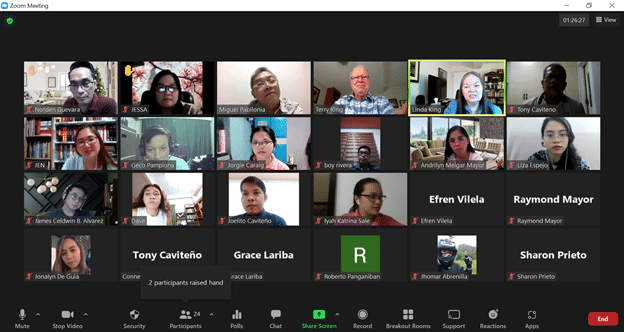AIM Institute has been providing training for Christian leaders since 2003. Our initial tactic was to send our instructors to teach a three-day intensive module in a local church. These intensive courses provided students with the opportunity to prepare for ministry while maintaining busy lives. Unfortunately, this approach provided limited opportunity for assignments and extended contact with the instructor. The Covid lock downs provided the opening to develop a hybrid approach.
Our hybrid approach allows AIM Institute to provide students with classroom and distance learning environments. In our new format, most courses are covered in the traditional semester of twelve weeks.
- Instructor lectures are video recorded. Each week students watch a lecture video at their convenience and complete course assignments. This provides a college level of delivery of instruction.
- A second course requirement is to attend a Zoom video conference meeting with the teacher and classmates each week. This provides a relational opportunity to draw from the experiences and wisdom of the instructor and classmates.
Past Courses
The following courses are completed and will run again in the future. Please contact us if you have a particular interest in seeing specific courses repeated soon.
Theology I is our introductory course in Bible doctrine. What is, and why is Theology important? Bibliology (Doctrine of the Bible) and Theology (Doctrine of God and Angels) are studied.
The Gospels of Matthew, Mark, and Luke are the earliest surviving accounts of the life and ministry of Jesus. This course will provide a historical background and review of these texts, paying special attention to the distinctive portrait of Jesus that each gospel presents, and discuss contemporary application.
This course develops the principles and methods of Bible interpretation. Four methods and five principles are examined. Examples are provided for each. The unique challenges of figurative language including parables, prophecy, types and symbols and poetry are addressed. The course concludes with an overview of Bible study methods. In these days of relativity where the Bible is often miss interpreted, this course should be considered a must for all believers.
This course will explore the key biblical mandates and foundational priorities established in scripture for ministry in the church and in the community. We will examine the differences between Old Testament and New Testament leadership, covering specific topics like team building, servant, and collegial leadership. We will explore the proper expression and application of spiritual authority and power and together we’ll unpack important aspects of discipleship, conflict resolution, and ministerial ethics.

Homiletics is the art and science of preaching. In this introductory course, the basic structure of the message will be explored. Three basic types of sermons will be explained. We assume that New Testament proclamation is the work of a messenger.
We will devote specific time to exploring biblical principles and practices needed to prepare ourselves to be messengers of God. Since similar methods are used to structure teaching, and other public opportunities to minister the Word of God. Therefore, this course will be useful even if one does not preach from a pulpit regularly.
This course is based on the words of Paul in Romans 8:29. The goal for every disciple is, “To become conformed to the image of His Son.” Rather than starting with a focus on external spiritual disciplines, this course begins by looking at the life of Christ within. Jesus forms a heart for disciplines and perseverance to walk in them. One is inspired to worship, to pray, fast, etc., not because of a commitment on a calendar but by the overflow from Christ within.
Future Courses
The following courses are currently in the development stage. To some degree, the timing for their release will be determined by interest. Please contact us if you have a particular interest in seeing specific courses developed soon.
This course is designed to build foundations for unity and strength in local church government and ministry life. Two perspectives are considered. First, common core philosophical concepts are examined. With this foundation established, we believe our Father has given every local church a unique calling and ministry, mission, and vision.
We believe that it is imperative for the local pastor to impart this “DNA” into future leader. Local church pastors are invited to join the teaching for this section imparting the DNA of the church they serve to its leaders.
 Hybrid courses available with AIM Institute
Hybrid courses available with AIM Institute